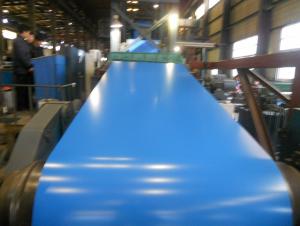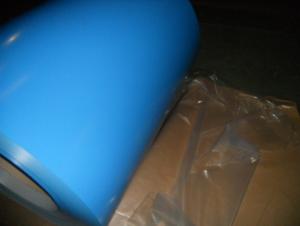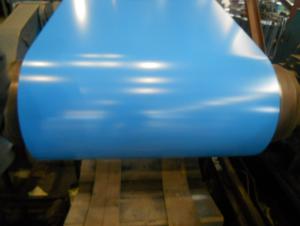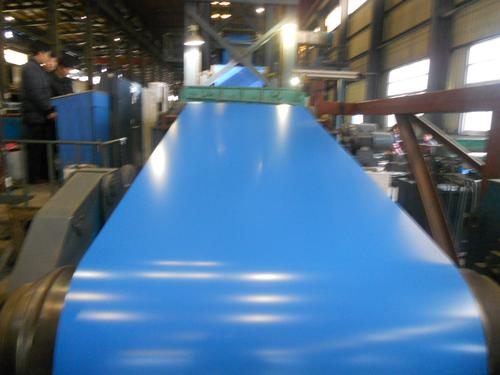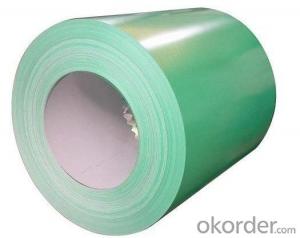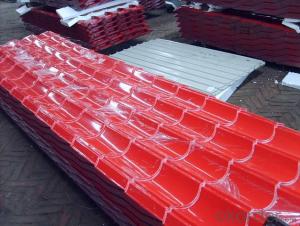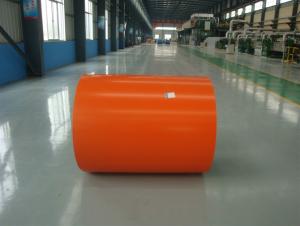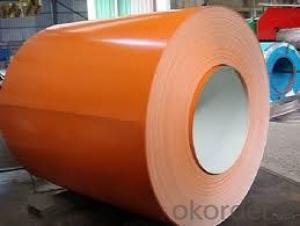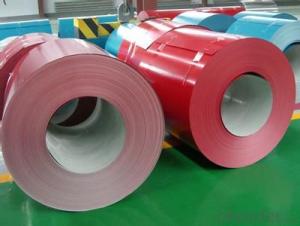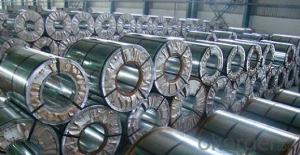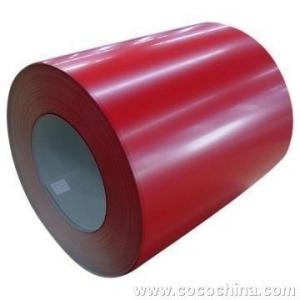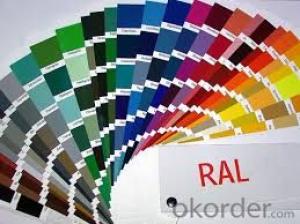PRE-PAINTED GALVANISED STEEL
- Loading Port:
- China Main Port
- Payment Terms:
- TT OR LC
- Min Order Qty:
- -
- Supply Capability:
- -
OKorder Service Pledge
OKorder Financial Service
You Might Also Like
Product Description:
Prepainted galvanized color coated PPGI steel:
| Thickness | 0.12-1.2mm |
| Width: | 700-1250mm |
| Material: | SGCC,SGCD,SECC,SECD,DX51D+Z |
| Zinc coating: | 30-180G/M2 |
| Surface Structure: | galvanized ,zero spangle, regular spangle or normal spangle |
| COLOR: | RAL numberor sample colour |
| Coating: | Topside: 5micron primer +15-20microns polyester Backside: 5-8microns primer epoxy. Surface treatment: chromated and oiled, chromated and non-oiled |
II Main characteristics :
1.strong corrosion resistance
2.surface quality
3.conducive to deep processing,such as corrugated steel sheet 4.economy and practicality
III Applications:
Household Appliance:
1.Refrigerator shutter &side panels, Washer, Freezers, Air conditions,
2.Rice Cooker, Microwave Ovens, Water Heaters, Sterilization Cabinets, Range Hoods
3.Computer Panels , DVD/DVB panels, TV back panel etc.
- Q: What is the maximum tension that steel coils can withstand during uncoiling?
- The maximum tension that steel coils can withstand during uncoiling depends on various factors such as the specific grade and thickness of the steel, the diameter and weight of the coil, and the handling equipment used. Generally, steel coils can withstand tension levels ranging from a few hundred pounds to several thousand pounds. It is crucial to consider manufacturer guidelines and industry standards to ensure safe and efficient uncoiling operations.
- Q: How do steel coils contribute to the manufacturing of agricultural machinery?
- The manufacturing of agricultural machinery heavily relies on steel coils, which play a vital role in this process. Typically, these coils are crafted from top-notch steel that possesses exceptional strength, durability, and resistance to corrosion. To begin with, agricultural machinery heavily relies on steel coils for the construction of its main structural components, including the chassis, frames, and supports. These components must endure heavy loads, extreme weather conditions, and rough terrains. Thanks to the strength and resilience of steel coils, the machinery can effectively handle these challenging environments and operate efficiently. In addition, steel coils find application in the production of various moving parts and mechanisms within agricultural machinery. For example, gears, shafts, and axles, which are crucial for power transmission and rotational motion transformation, are created using steel coils. The high tensile strength and excellent machinability of steel make it an ideal material for these essential components, ensuring their reliability and longevity. Moreover, steel coils contribute to the manufacturing of agricultural machinery by providing a protective layer against wear and tear. Often, these coils are coated with specialized finishes or paints to enhance their resistance to rust, chemicals, and abrasion. This protective layer significantly prolongs the machinery's lifespan, reduces the need for frequent maintenance and repairs, and ultimately increases its overall efficiency and productivity. Furthermore, the versatility of steel coils allows for customization and adaptation to meet the specific requirements of agricultural machinery. Manufacturers can shape and mold the coils into different sizes and dimensions, enabling the production of machinery suitable for various farming practices and applications. Whether it's tractors, harvesters, or irrigation systems, steel coils are crucial for creating versatile and dependable agricultural machinery. In conclusion, steel coils are essential in the manufacturing of agricultural machinery due to their strength, durability, resistance to corrosion, and customization capabilities. From structural components to moving parts and protective coatings, steel coils greatly contribute to the efficiency, reliability, and longevity of agricultural machinery, thus providing significant support to the global agricultural industry.
- Q: How are steel coils processed and treated?
- Steel coils are processed and treated through a series of steps. Initially, the steel is cleaned and pickled to remove any impurities. It is then passed through a series of rolling mills to reduce its thickness and increase its length. The coils are then annealed to improve their strength and ductility. Further treatments such as galvanizing or coating can be applied to enhance corrosion resistance or improve aesthetic appeal. Finally, the coils are cut and packaged according to customer specifications before being shipped for various applications in industries such as construction, automotive, and manufacturing.
- Q: looking for a good pocket knife. i keep going through these 440 steel pocket knives with every day work usage. this will be my 4th. even when i use a whetstone they stay sharp for a short period of time but the edge does not last, 440 is too soft! what is a good steel to look for in a pocket knife? also what are some good brands. ive been using gerber and buck sofar. if you could recommend me a few mid/small sized knives i would greatly appreciate it!
- Best Steel For Pocket Knife
- Q: Can steel coils be embossed?
- Yes, steel coils can be embossed. Embossing is a process that involves creating raised or indented patterns on a surface, and it can be done on various materials including steel coils. This technique is often used to enhance the aesthetic appeal or provide functional properties to the steel coils.
- Q: How are steel coils stored to prevent damage?
- In order to prevent damage and maintain their integrity, steel coils are stored in a manner that is designed to minimize risks. One common approach involves horizontally stacking the coils, which helps evenly distribute the weight and reduces the likelihood of deformation or damage. Additionally, each layer of coils is often separated by wooden or steel dunnage to provide support and prevent shifting during storage or transportation. To protect the coils from harm, they are frequently stored indoors or in covered areas to shield them from exposure to the elements. This precaution serves to prevent rusting or corrosion, which could compromise the steel's quality. In situations where outdoor storage is necessary, weather-resistant tarps or protective coatings may be used to minimize the potential impact of rain, snow, or sunlight. Moreover, it is essential to consider the height at which the coils are stacked in order to avoid applying excessive pressure on the lower coils. To prevent damage, coils are typically stacked in a manner that ensures the weight from the upper layers is evenly distributed across the lower ones. This may involve the utilization of specialized stacking equipment or racks that are specifically designed to handle the weight and dimensions of the coils. In summary, the proper storage of steel coils entails careful attention to weight distribution, protection from the elements, and minimizing contact between coils to prevent damage and preserve their quality.
- Q: Im looking to learn guitar and i was wondering if steel strings are too hard to use as a beginner. I am also self teaching so any good lesson books/starting guitar recommendations are welcome !! thanks.
- Steel strings are fine for a beginner. I learned to play on Steel strings and I have always preferred them to nylon strings.
- Q: What are the different methods of joining steel coils?
- There are several methods used for joining steel coils, including welding, brazing, soldering, and mechanical fastening. Welding is the most common method, which involves melting the edges of the coils and fusing them together. Brazing and soldering involve using a filler metal with a lower melting point to join the coils. Mechanical fastening methods include using bolts, screws, or clips to connect the coils together. Each method has its own advantages and is chosen based on the specific requirements and constraints of the application.
- Q: What are the main factors that affect the strength of steel coils?
- The main factors that affect the strength of steel coils include the quality and composition of the steel used, the manufacturing process, the thickness and width of the coils, and any heat treatment or tempering applied to the steel. Additionally, factors such as storage conditions, handling, and transportation can also impact the strength of steel coils.
- Q: Steel is strong in both tension and compression. Concrete is only strong in compression, and is very fragile in tension. Plus, concrete is heavy--a huge drawback in, say, a bridge deck. And its fairly expensive. And it hides the condition of the steel embedded within it. So what does it bring to the table? Why use it at all?
- Pre stressed concrete is held in compression by the steel cables within.
Send your message to us
PRE-PAINTED GALVANISED STEEL
- Loading Port:
- China Main Port
- Payment Terms:
- TT OR LC
- Min Order Qty:
- -
- Supply Capability:
- -
OKorder Service Pledge
OKorder Financial Service
Similar products
Hot products
Hot Searches
Related keywords
